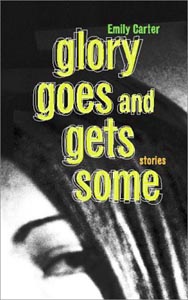![[MetroActive Books]](/gifs/books468.gif)
[ Books Index | North Bay | MetroActive Central | Archives ]
Three story collections will have 'em beggin' Santa for more
By Patrick Sullivan
THEY WRAP up into neat little packages, they fit snugly under the smallest tree, and they're cheaper than a PlayStation 2. Yup, books would make the perfect holiday gift, except for one inconvenient fact: Nobody reads anymore.
OK, perhaps that's a slight exaggeration. Let's be prudent. Let's be diplomatic. Better to say that an awful lot of people don't seem to have much time for reading in this busy era of virtual this and 24-7 everything else. (And no, all you grouchy ultra-literary types, we don't want to hear your snarky little ideas for turning everybody's television sets into flower planters.)
So, if you like books, or at least like giving books as gifts, you have two choices. Go ahead and give your nephew that unexpurgated version of Les Miserables (in the original French? Sure, why not?), and know that even the back cover will probably never be read.
Or (and this is the right answer, in case you hadn't guessed) you could latch onto a literary form that's been around for . . . well, a long time, but that seems more relevant than ever in our oh-so-busy age. And we're not talking about porn.
Seldom has the short story seemed so strong. Some of the best authors of turn-of-the-millennium America are working in this form, which requires both boundless creativity and rigorous discipline from the writer--but only 20 minutes here and there from a reader.
First, check out what may be the year's best bundle of short fiction: Emily Carter's Glory Goes and Gets Some (Coffee House Press; $20.95). This series of linked stories mostly follows the adventures of sardonic young hipster as she moves from drug-addicted squalor to recovery in the bland Midwest to the appalling discovery that a shared needle somewhere along the way polluted her bloodstream with the AIDS virus. How does a 30-something recovering heroin addict with an incurable disease find new life and new love? Answer: Very carefully.
Carter's prose is wild, exuberant, and sensual in the best possible way, full of both vivid neon images and sarcastic critical distance. Finely wrought, but never cautious, this is the end of the millennium the way it should be written.
Of course, not everyone on your list will appreciate the needle-sharp kiss of Carter's fiction. For something more conventional--in both style and subject matter--try Light Action in the Caribbean (Knopf; $22), a new collection of shorts from Barry Lopez, best known for such non-fiction work as Arctic Dreams.
Lopez writes like a fox stepping across a field of new-fallen snow--lightly and carefully. With barebones sentences, he puts together deceptively simple-seeming stories that subtly take on flesh and trot gracefully across the page. Among the best of the work in this collection: "Emory Bear Hand's Birds," in which an Indian inmate shakes a prison to its foundations with nothing more than his knowledge of wild animals; and "The Deaf Girl," in which a man wanders into a small town and watches from the porch of his hotel as a horrendous tragedy slowly plays out before his eyes.
Finally, there is The Best American Short Stories: 2000 (Houghton Mifflin; $13), a collection of shorts from 21 writers assembled by this year's guest editor, author E. L. Doctorow (Ragtime). From Geoffrey Becker's "Black Elvis," in which an Elvis impersonator discovers the real power of the legend he has made his life, to Annie Proulx's "People in Hell Just Want a Drink of Water," this truly is among the best short fiction you'll find on the shelves. Or under the tree.
[ North Bay | MetroActive Central | Archives ]
Copyright © Metro Publishing Inc. Maintained by Boulevards New Media.
![]()
 The Short Answer
The Short Answer
From the December 21-27, 2000 issue of the Northern California Bohemian.